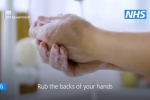Questions and answers regarding Coronavirus (COVID-19)
Short answers to questions you might have about the virus.
Where can I get the latest government information?
If you want access to all Government advice on coronavirus you'll find it here.
When should you self-isolate?
- If you have a high temperature or new, continuous cough
- You must self-isolate for 10 days if you live alone
- You must all self-isolate for 14 days if you live with others (if someone gets symptoms during isolation all householders must remain symptom free for 7 days even if that means isolating for more than 14 days)
Self-isolation will save lives - it's important you follow the guidance if you're affected.
You do not need to call NHS 111 to self-isolate.
If your symptoms worsen during isolation or are no better after 7 days contact the NHS online coronavirus service . If you have no internet access, you should call NHS 111. For a medical emergency dial 999.
Should I use hand sanitiser gel or soap and water?
You should wash your hands with soap and water for at last 20 seconds regularly but particularly when you return home. If you're out and about and cannot get access to soap and water cleaning your hands thoroughly with hand sanitiser gel can be effective against the virus.
How can I get tested?
You can apply to a test for yourself or anyone in your household with symptoms online at https://www.gov.uk/get-coronavirus-test
Alternatively, you can call 119 (between 7am and 11pm). People with hearing and speech difficulties can call 18001119.
Do I need to wear a face mask?
The Welsh Government has stated that wearing face masks in shops and other indoor public places is a legal requirement. Both customers and staff in all indoor public places are required to wear a mask, this includes shops, public transport, places of worship, hairdressers and salons, cinemas and museums, gyms and leisure centres and anywhere that is open to the public.
Face coverings are not required when consuming food and drink inside a café, restaurant or pub. However, in places where food and drink are offered as takeaway, you will need to wear a mask in the parts of the premises where people are not eating or drinking.
You are exempt from wearing a face covering if (for example):
- You are not able to put on or to wear a face covering because of a physical or mental illness, or because of a disability or impairment;
- You are accompanying somebody who relies on lip reading where they need to communicate; or
- You are escaping from a threat or danger and don’t have a face covering
Appropriate temporary removal of face coverings includes:
- You need to take medicine;
- You need to eat or drink; or
- You need to remove face covering to avoid harm or injury, either to yourself or others – for example to get someone’s attention about a danger.
What financial support can I get?
The Government have introduced significant measures to protect the financial resilience of individual and businesses and in light of the new fire-break restrictions, have announced new financial support measures which will open in the next week. The following two organisations provide updated and detailed support and advice about your money in light of coronavirus (COVID-19).
- This up-to-date guide from the Money Advice Service is easy to follow and filled with good advice about Government initiatives, sick pay and changes to claiming your benefits during this challenging time.
- The advice and benefits and grants calculators at Turn2Us are useful to get support if the coronavirus has had a negative impact on your finances.
Can I get up-to-date news about coronavirus (COVID-19)?
You can get up to date coronavirus information here for the UK and here for information about Wales and any local lockdowns.
You can also register to the Government free to use WhatsApp information service. To use the free GOV.UK Coronavirus Information Service on WhatsApp, simply add 07860 064422 in your phone contacts and then message the word ‘hi’ in a WhatsApp message to get started.
Can I claim sick pay?
You could get SSP if you’re self-isolating because:
- you or someone you live with has coronavirus symptoms or has tested positive for coronavirus
- you’ve been notified by the NHS or public health authorities that you’ve been in contact with someone with coronavirus
- someone in your ‘support bubble’ (or your ‘extended household’ if you live in Scotland or Wales) has coronavirus symptoms or has tested positive for coronavirus
- you’ve been advised by a doctor or healthcare professional to self-isolate before going into hospital for surgery
You can also get SSP if both of the following apply:
- you live or work in an area with local restrictions in place, including advice to ‘shield’ (take extra precautions to reduce contact with others)
- you’ve been advised to shield because you’re at very high risk of severe illness from coronavirus
You cannot get SSP if you’re self-isolating after entering or returning to the UK and do not need to self-isolate for any other reason.
You could get SSP for every day you’re off work.
What if I have a 'zero hours' contract?
You may be entitled to Statutory Sick Pay. Check with your employer in the first instance and if you're not entitled to Statutory Sick Pay, you may be able to apply for Universal Credit or Employment and Support Allowance (ESA) .
What if I’m self-employed?
You can apply for Universal Credit - where self-employed people can access full statutory sick pay equivalent.
What if the whole family has to stay at home so we have no income?
If no one is getting Statutory Sick Pay, the family can apply for Universal Credit - the Government have changed certain rules governing this benefit during the coronavirus period.
LAST UPDATED 13/04/21

